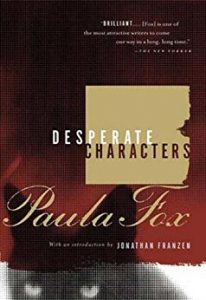PAULA FOX’S DESPERATE CHARACTERS REDISCOVERED
 Paula Fox died on March first, although I didn’t know it. I happened to be reading Desperate Characters at the time. I didn’t know who the author was or why I was reading Desperate Characters. My best guess was that a Goodreads friend had recommended the book and I’d downloaded it, with so many others, to my Kindle. Because Kindle doesn’t give copyright or original publication dates for books – an unforgivable sin, to my mind – I didn’t even know whether Desperate Characters was an older book or a recent one set in the sixties. What I did know, or realized as I got into the book, was the fact that I was reading not just good but great fiction. He wasn’t a seducer. He was remote. He was like a man preceded into a room by acrobats.
Paula Fox died on March first, although I didn’t know it. I happened to be reading Desperate Characters at the time. I didn’t know who the author was or why I was reading Desperate Characters. My best guess was that a Goodreads friend had recommended the book and I’d downloaded it, with so many others, to my Kindle. Because Kindle doesn’t give copyright or original publication dates for books – an unforgivable sin, to my mind – I didn’t even know whether Desperate Characters was an older book or a recent one set in the sixties. What I did know, or realized as I got into the book, was the fact that I was reading not just good but great fiction. He wasn’t a seducer. He was remote. He was like a man preceded into a room by acrobats.
 I had to look at the Wikipedia page for Paula Fox to learn that “Desperate Characters, an acknowledged masterpiece, came next [among her adult novels] with Alfred Kazin calling it a ‘brilliant performance’ and ‘quite devastating’ while Lionel Trilling described it as ‘a reserved and beautifully realized novel’.”
I had to look at the Wikipedia page for Paula Fox to learn that “Desperate Characters, an acknowledged masterpiece, came next [among her adult novels] with Alfred Kazin calling it a ‘brilliant performance’ and ‘quite devastating’ while Lionel Trilling described it as ‘a reserved and beautifully realized novel’.”
When Otto came home, he discovered Sophie off in a corner of the living room, sitting in a formal chair no one ever sat in, stippled with light and shadow. Her silence and the dining room table set for dinner, which he glimpsed through the living room doors, looked like a set piece arranged for some purpose that had subsequently been forgotten. He had the impression she was weeping without sound, and that perhaps the elements of this forlorn scene had been contrived for his benefit, a domestic lesson that was to elicit from him an apology. He spoke brusquely. ‘Why are you sitting there like an orphan?’
Otto and Sophie, lawyer husband and translator wife who isn’t working, share love, but their marriage lacks joy and warmth, of the latter at least sustained warmth. Still young enough – just – to have children, they won’t, we understand. Neither likes the world they see, including the decay of Brooklyn, where they live, and Sophie doesn’t like the self she sees in it.
Sophie was plagued by a vision of herself sliding effortlessly toward a sickly dependence on bodily comfort.
The Telegraph article “Paula Fox Interview: the Novelist Talks of her Turbulent Life,” gives a succinct account of Desperate Characters: “the protagonist is bitten by a stray cat she is being kind to, and then spends the next three days worrying that she might have rabies. Her cold-sweat dread is what drives the book, becoming a metaphor for her fragile marriage.”
In “Rereading Paula Fox’s ‘Desperate Characters’,” in The New Yorker on March 4, Alexandra Schwartz says, “In many ways, Sophie is a woman of her time, a child of the Depression and of the Second World War. Born a decade too early to take full advantage of feminism’s imminent second wave, she is too privileged to have to work for money, too smart to be idle and stay sane. She is drawn to the vitality of the younger boomer generation, which is bound to hers by what Fox depicts as a posture of mutual contempt. (It is funny and oddly familiar to see the boomers, in their hippie phase, derided by their parents’ generation as self-involved and unserious, as boomers sometimes deride millennials now.)”
A children’s author who won both the Hans Christian Andersen Award and the Newbery Medal, “Only in her 40s did she begin her first novel, Poor George, about a cynical schoolteacher who finds purpose—and ruin—in mentoring a vagrant teenager. The novel was received well…but sold poorly, a pattern that all her adult novels would follow…By 1992 all six of her novels were out of print.” (Wikipedia page for Paula Fox).
“Then, in 1996, in an essay for Harper’s magazine, the novelist Jonathan Franzen hailed [Desperate Characters] as a masterpiece and a whole new generation rediscovered it.” (from The Telegraph, cited above).
To my mind, so much of what makes great fiction lies in the author’s use of words to convey images. Consider:
It smelled of the tobacco ashes which had flooded the two standing metal ashtrays. On the chromium lip of one, a cigar butt gleamed wetly like a chewed piece of beef.
Through the open kitchen door, Sophie felt the morning sunlight on her bare feet like a sustained and mindless stare.
Hats off to Jonathan Franzen for inspiring the rediscovery of Paula Fox’s adult fiction. I look forward to reading her other five novels.
Gary Garth McCann
First-prize winner for short works and for suspense/mystery, Maryland Writers’ Association, Gary Garth McCann is the author of the novella Young and in Love? and of the novels The Shape of the Earth and The Man Who Asked To Be Killed, praised at the Washington Independent Review of Books. His most recent published stories are available online in Chelsea Station Magazine, Erotic Review Magazine, and in Mobius: The Journal of Social Change. His other stories appear in The Q Review, reprinted in Off the Rocks, in Best Gay Love Stories 2005, and in the Harrington Gay Men’s Fiction Quarterly. See his blogs at garygarthmccann.com and streamlinermemories.com.
- Web |
- More Posts(57)